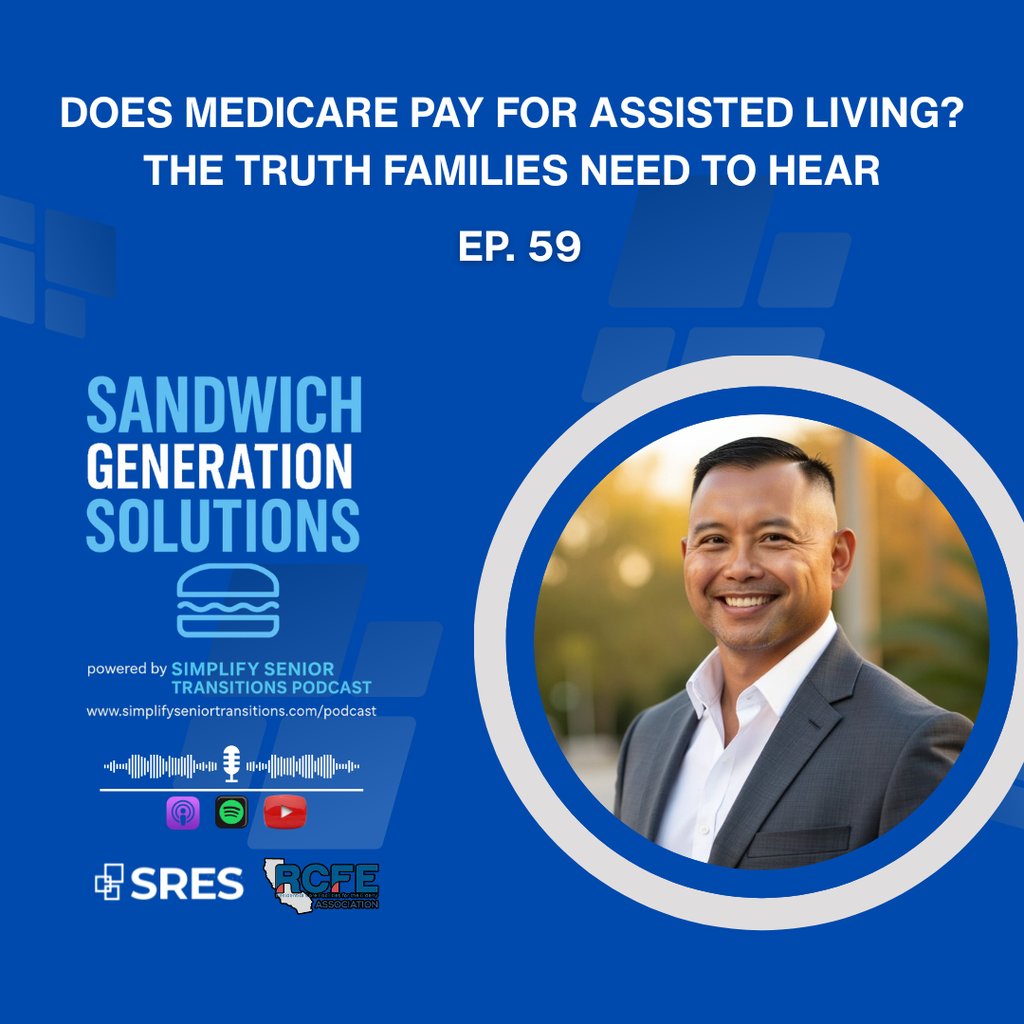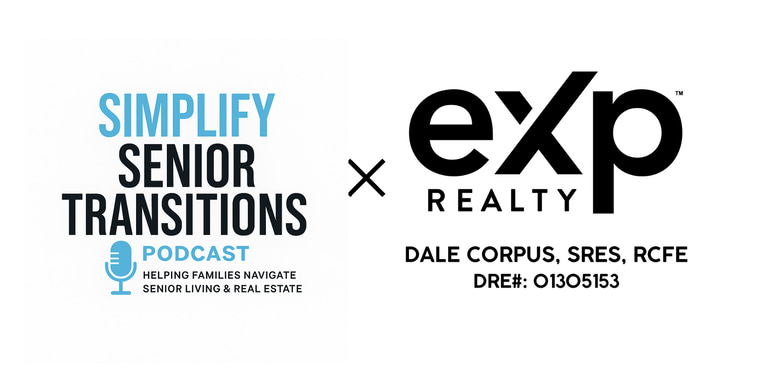The Medicare Myth That Could Cost Bay Area Families Thousands
Why Medicare doesn’t cover assisted living—and what smart planning can do to protect your loved ones.
Dale Corpus
9/4/20254 min read
Navigating Senior Living: The Medicare Myth You Can't Afford to Believe (Especially in the Bay Area!)
As adult children, many of us find ourselves in the "Sandwich Generation," balancing our own lives with the increasing needs of our aging parents. When the time comes to consider assisted living, the financial aspect can feel like an overwhelming mountain to climb. You might assume, like many, that Medicare will step in to cover the costs, especially after decades of your parents paying into the system. But what if that assumption could cost your family tens of thousands of dollars every year?
In a recent episode of the Simplify Senior Transitions Podcast, Dale Corpus, a senior transition specialist and real estate expert based in the San Francisco Bay Area, cuts straight to the heart of this crucial issue. Speaking directly to families in our high-cost region – from Contra Costa and Alameda to Santa Clara, San Mateo, San Francisco, Solano, and Napa counties – Dale offers real stories, expert insights, and practical tips to help you navigate these complexities.
Here's what you'll learn in this episode:
The hard truth about Medicare and assisted living: Why Medicare isn't designed to cover housing or long-term personal care needs, leading to significant financial shock for many families.
What Medicare does cover: A clear breakdown of the valuable healthcare benefits Medicare provides for seniors.
Understanding the true costs in the Bay Area: Specific figures for assisted living and memory care in our region that underscore the urgency of financial planning.
Practical alternatives to bridge the financial gap: Exploring options like Medi-Cal, long-term care insurance, private pay, and smart hybrid planning strategies.
Key myths about Medicare debunked: Essential facts to prevent devastating financial surprises.
Why early planning is your most powerful tool: How proactive steps can save your family from crisis and reduce stress.
The Hard Truth About Medicare and Assisted Living
Let's address the most common question Dale hears: Does Medicare pay for assisted living? The quick answer, as Dale emphasizes, is a resounding no. Not in the way most people think, anyway.
Consider the Chen family in San Jose, who moved their dad into assisted living after his Parkinson's symptoms worsened. When they received the first bill for over $7,000 for rent, meals, and personal care, they were stunned to learn that Medicare wouldn't pay a dime. Their dad had worked for decades, paying into Medicare, yet it offered no coverage for his assisted living costs. This misunderstanding, as Dale points out, costs families "tens of thousands of dollars every year."
Why? Because Medicare is health insurance, not long-term care insurance. It was never designed to pay for housing or personal care needs. This means that assisted living rent, meal plans, help with daily activities like bathing, dressing, or toileting, and long-term custodial care are simply not covered.
Even if you've heard Medicare covers nursing homes, it's a critical distinction: Medicare covers short-term rehab in a skilled nursing facility, not indefinite nursing home or assisted living stays.
This reality is especially tough in our Bay Area communities:
Assisted living in Contra Costa and Alameda counties: $5,000–$6,000/month
Memory care in Santa Clara County: $8,000–$10,000/month
Board and care homes: $5,000–$7,000/month
Annually, that’s a staggering $60,000–$120,000. Families expecting Medicare to cover these significant expenses are often blindsided when the bills start arriving.
What Medicare Does Cover (And Why It Matters)
While Medicare doesn't cover assisted living, it's still a valuable resource for healthcare needs. It covers important services for seniors, including:
Hospital stays (after being admitted)
Short-term skilled nursing (up to 100 days, if specific requirements are met after a hospital stay)
Rehabilitation such as physical or occupational therapy
Medically necessary home health services
Hospice care when facing a terminal illness
These benefits can save families thousands in medical costs, as they are healthcare-related. For example, the Chen family learned that while Medicare didn't cover their dad's assisted living apartment, it did cover his Parkinson's medications, therapy sessions, and some in-home skilled nursing visits before he moved.
Bridging the Gap: Your Options for Funding Senior Care
So, if Medicare won't pay for assisted living, what are your options? Dale highlights several critical resources:
Medi-Cal (California's Medicaid program): Programs like the Assisted Living Waiver (ALW) and CalAIM can help cover assisted living costs for those who qualify. However, there are eligibility requirements and often wait lists.
Long-term care insurance: If your parent purchased a policy years ago, this may help cover assisted living or in-home care.
Private pay: Many families use a combination of savings, pensions, or proceeds from selling the family home to fund assisted living. For many Bay Area families, downsizing and selling a senior’s home is a major consideration.
Hybrid planning: Often the best strategy. Combining Medicare for medical care, Medi-Cal for housing (if eligible), and personal funds or long-term care insurance to fill the financial gap.
The Chen family used this hybrid strategy, combining Medicare for medical needs and Medi-Cal for housing, dramatically reducing their out-of-pocket burden.
Dispelling Common Medicare Myths
Myth 1: Medicare pays for assisted living → ❌ False.
Myth 2: Medicare will pay for long-term nursing home care → ❌ False. Only short-term rehab stays are covered.
Myth 3: If you're on Medicare, you're financially set → ❌ False. Medicare doesn't cover housing or custodial care, which are the biggest costs Bay Area families face.
Why Early Planning is Your Superpower
The biggest takeaway is this: planning early prevents financial shock. Waiting until a crisis hits leaves you scrambling and vulnerable to immense financial and emotional stress.
Understanding what each program covers and learning how to layer them together – as the Chen family's hybrid planning shows – is crucial.
This journey involves many complex decisions, from choosing the right care options to navigating the emotional process of downsizing and selling a cherished family home. Being informed and proactive is the key to navigating these transitions successfully.
Ready to Navigate Senior Transitions with Confidence?
Understanding these distinctions and exploring your options early can make all the difference for your family. Don't wait until you're in crisis.
👉 If your loved one is considering senior living and you need to figure out what to do with their home, or you have questions about financing senior care, schedule a FREE consultation with Dale Corpus at www.simplifyseniortransitions.com.
🎧 You can also listen to the full Sandwich Generation Solutions podcast episode on YouTube, Spotify, Apple Podcasts, and all major platforms.
📲 For quick questions, DM Dale on Instagram @soldbydale.
P.S. Got news or an amazing story to share? Email us at dale.corpus@exprealty.com and you might be featured in our next episode!
Watch The Podcast Here



Transitions Made Simple
Helping seniors transition with ease and peace.
📍 Serving the San Francisco Bay Area
📞 GET IN TOUCH
📬 STAY INFORMED
Dale Corpus, SRES, RCFE
📱 925-380-1657
📧 dale@simplifyseniortransitions.com
🕓 Available for free 15 min consultations by appointment
© 2026. All rights reserved.
Sign up for monthly senior transition tips & real estate insights.
